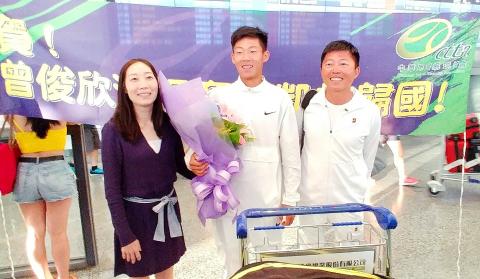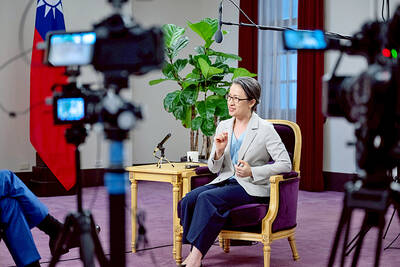Taiwanese tennis player Tseng Chun-hsin (曾俊欣) yesterday cited jet lag and humid weather as reasons for withdrawing from his first match in the International Tennis Federation Formosa Cup Men’s Circuit.
Tseng, who won the boys’ title at the French Open and Wimbledon, on Tuesday returned home and was playing against Taiwan’s Yin Pang-shuo (伊邦碩) yesterday morning when he withdrew during the first set, which he was losing 4-5.
“I just returned from Europe and have not gotten over the jet leg yet. The weather here is more humid and my head felt a bit heavy when I stepped onto the court. I also had a bit of heat stroke. I might take a few days off and prepare for the games next week,” he said.

Photo: Tony Yao, Taipei Times
In addition to the two Grand Slam titles, Tseng also won second place at the Australia Open this year. He is ranked No. 1 in the federation’s junior category and No. 601 in the Association of Tennis Professionals ranking.
Tseng began playing tennis at the age of four. His parents sold candied fruits on skewers at a night market in New Taipei City’s Yonghe District (永和) to pay for his training, which is the reason he is known as the “young tennis king from the night market.”
Commenting on his victory in Wimbledon, Tseng said that he felt more confident about playing in the tournament after winning the French Open.
“When playing against Briton Jack Draper in the finals, I knew that the spectators were mostly rooting for him. I knew I needed to concentrate on my own game and try not to be distracted,” he said.
In the beginning of the second set, he failed to break Draper’s serve and became nervous about holding his own serve, Tseng said.
“In the third set, I told myself I needed to enjoy the game and bring my best to the court,” he said.
Tseng beat Draper 6-1, 6-7, 6-4.
Tseng said he was more accustomed to playing on grass than other players thanks to his experience at Wimbledon last year.
However, he said that he prefers clay, because he likes engaging in intense rallies with his opponents at the base line, and the clay court helps slow the game down.
Tseng will turn 17 next month. He shares the same birthday as the Swiss legend Roger Federer, who won the Wimbledon boys’ title in 1998.
A soon-to-be high-school sophomore, Tseng said that he often needs to juggle schoolwork and tennis practice.
Nevertheless, he is determined to become a professional tennis player next year because he likes tennis and wants to challenge himself, Tseng said.
“Professional players are more mature and their performance is more stable. They also undergo more strenuous physical training to ensure that they are fit for competition,” Tseng said.
Tseng said he needs to maintain a stable mind, be aggressive in scoring crucial points and minimize his unforced errors when he becomes a professional player.
His father, Tseng Yu-te (曾育德), said that when his son turns professional, he would need a team of trainers, which consists of at least one coach, one physical trainer and one athletic trainer.
They would need sponsors to cover the expenses, he added.

China might accelerate its strategic actions toward Taiwan, the South China Sea and across the first island chain, after the US officially entered a military conflict with Iran, as Beijing would perceive Washington as incapable of fighting a two-front war, a military expert said yesterday. The US’ ongoing conflict with Iran is not merely an act of retaliation or a “delaying tactic,” but a strategic military campaign aimed at dismantling Tehran’s nuclear capabilities and reshaping the regional order in the Middle East, said National Defense University distinguished adjunct lecturer Holmes Liao (廖宏祥), former McDonnell Douglas Aerospace representative in Taiwan. If

TO BE APPEALED: The environment ministry said coal reduction goals had to be reached within two months, which was against the principle of legitimate expectation The Taipei High Administrative Court on Thursday ruled in favor of the Taichung Environmental Protection Bureau in its administrative litigation against the Ministry of Environment for the rescission of a NT$18 million fine (US$609,570) imposed by the bureau on the Taichung Power Plant in 2019 for alleged excess coal power generation. The bureau in November 2019 revised what it said was a “slip of the pen” in the text of the operating permit granted to the plant — which is run by Taiwan Power Co (Taipower) — in October 2017. The permit originally read: “reduce coal use by 40 percent from Jan.

‘SPEY’ REACTION: Beijing said its Eastern Theater Command ‘organized troops to monitor and guard the entire process’ of a Taiwan Strait transit China sent 74 warplanes toward Taiwan between late Thursday and early yesterday, 61 of which crossed the median line in the Taiwan Strait. It was not clear why so many planes were scrambled, said the Ministry of National Defense, which tabulated the flights. The aircraft were sent in two separate tranches, the ministry said. The Ministry of Foreign Affairs on Thursday “confirmed and welcomed” a transit by the British Royal Navy’s HMS Spey, a River-class offshore patrol vessel, through the Taiwan Strait a day earlier. The ship’s transit “once again [reaffirmed the Strait’s] status as international waters,” the foreign ministry said. “Such transits by

Taiwan is doing everything it can to prevent a military conflict with China, including building up asymmetric defense capabilities and fortifying public resilience, Vice President Hsiao Bi-khim (蕭美琴) said in a recent interview. “Everything we are doing is to prevent a conflict from happening, whether it is 2027 or before that or beyond that,” Hsiao told American podcaster Shawn Ryan of the Shawn Ryan Show. She was referring to a timeline cited by several US military and intelligence officials, who said Chinese President Xi Jinping (習近平) had instructed the Chinese People’s Liberation Army to be ready to take military action against Taiwan